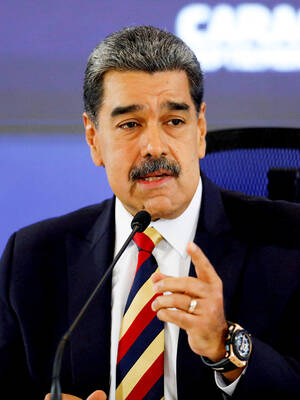US Secretary of State Antony Blinken is to meet with top Chinese officials on Thursday next week in Alaska, the White House said on Wednesday, the first high-level in-person contact between the two countries under the administration of US President Joe Biden.
The meeting, taking place on Blinken’s return from his first overseas trip to key US allies Japan and South Korea, would come amid a major US diplomatic push to solidify alliances in Asia and Europe to counter China.
US National Security Adviser Jake Sullivan is to join the meeting in Anchorage with Chinese Central Foreign Affairs Commission Director Yang Jiechi (楊潔篪) and Chinese Minister of Foreign Affairs Wang Yi (王毅), White House press secretary Jen Psaki said, adding that the administration would approach its relations with China “in lockstep” with its partners.
“It was important to us that this administration’s first meeting with Chinese officials be held on US soil, and occur after we have met and consulted closely with partners and allies in both Asia and Europe,” Psaki told a news briefing.
The meeting would be “an opportunity to address a wide range of issues, including ones where we have deep disagreements,” she said.
China’s embassy in Washington did not immediately respond to a request for comment.
The Biden administration has committed to reviewing elements of US policies toward China, as the world’s two largest economies navigate frosty relations that sank to their lowest depths in decades during the administration of former US president Donald Trump.
Biden and Chinese President Xi Jinping (習近平) last month held their first telephone call as leaders and appeared at odds on most issues, even as Xi said that confrontation would be a “disaster” for the two nations.
Testifying before the US House of Representatives Foreign Affairs Committee on Wednesday, Blinken said that next week’s meeting would not be a return to regular senior-level dialogues used under past US administrations, which had been criticized in Washington for yielding little progress on US grievances with Beijing.
“There’s no intent at this point for a series of follow-on engagements,” Blinken said. “Those engagements, if they are to follow, really have to be based on the proposition that we’re seeing tangible progress and tangible outcomes on the issues of concern to us with China.”
If China insists that it is not violating the human rights of Uighurs in Xinjiang, it should provide the world access to the area, Blinken added.
UN experts and human rights groups have said that China has detained more than 1 million Uighurs and other minorities in Xinjiang, actions the US has deemed to be genocide.
The talks are to follow the visit by Blinken and US Secretary of Defense Lloyd Austin to Japan and South Korea next week, as well as an online summit today between Biden and the leaders of Japan, India and Australia.
Bonnie Glaser, an Asia expert at the Center for Strategic and International Studies, said that the timing of the meeting sends the message to Beijing that the US’ alliances are strong.
Discussions are likely to focus on the Chinese government’s policies toward Hong Kong, its pressure on Taiwan, its treatment of Uighurs and what Washington sees as economic coercion against Australia, she said.

VENEZUELAN ACTION: Marco Rubio said that previous US interdiction efforts have not stemmed the flow of illicit drugs into the US and that ‘blowing them up’ would US President Donald Trump on Wednesday justified a lethal military strike that his administration said was carried out a day earlier against a Venezuelan gang as a necessary effort by the US to send a message to Latin American cartels. Asked why the military did not instead interdict the vessel and capture those on board, Trump said that the operation would cause drug smugglers to think twice about trying to move drugs into the US. “There was massive amounts of drugs coming into our country to kill a lot of people and everybody fully understands that,” Trump said while hosting Polish President

A French couple kept Louise, a playful black panther, in an apartment in northern France, triggering panic when she was spotted roaming nearby rooftops. The pair were were handed suspended jail sentences on Thursday for illegally keeping a wild animal, despite protesting that they saw Louise as their baby. The ruling follows a September 2019 incident when the months-old feline was seen roaming a rooftop in Armentieres after slipping out of the couple’s window. Authorities captured the panther by sedating her with anesthetic darts after she entered a home. No injuries were reported during the animal’s time on the loose. The court in the

Japan yesterday heralded the coming-of-age of Japanese Prince Hisahito with an elaborate ceremony at the Imperial Palace, where a succession crisis is brewing. The nephew of Japanese Emperor Naruhito, Hisahito received a black silk-and-lacquer crown at the ceremony, which marks the beginning of his royal adult life. “Thank you very much for bestowing the crown today at the coming-of-age ceremony,” Hisahito said. “I will fulfill my duties, being aware of my responsibilities as an adult member of the imperial family.” Although the emperor has a daughter — Princess Aiko — the 23-year-old has been sidelined by the royal family’s male-only

For more than a century, the fate of the dazzling Darya-e-Noor diamond has been sealed inside a bank vault — a mystery that haunts Khawaja Naim Murad, great-grandson of the last prince, or nawab, of Dhaka. Locked away in 1908, were the family’s heirlooms lost during the violence at the end of British rule in 1947? Did they survive Bangladesh’s war of independence in 1971 and the string of coups that followed, or are they still safe, dusty, but untouched? Many suspect that the jewels are long gone and officials at the state-run bank hesitate to simply open the vault, fearing that they